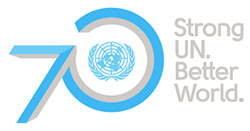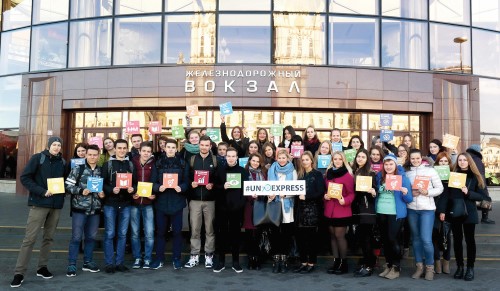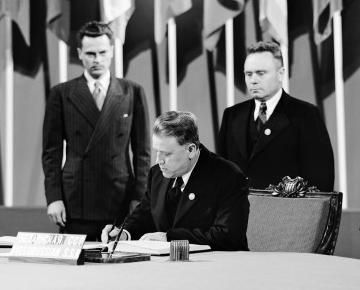The Charter was signed on 26th June 1945 by the representatives of 50 countries, including Belarus (Byelorussian Soviet Socialist Republic at that time). There were 51 founding members in 1945.
In accordance with Article 110, the Charter entered into force on 24th October 1945, after ratification by the five permanent members of the Security Council and a majority of the other countries.

K. Kiselev, Byelorussian Minister for Foreign Affairs signs United Nations Charter. 26 June 1945, San Francisco, United States
UN 70 Express for SDGs to spotlight the UN Anniversary in Belarus
If you come to Belarus in October you cannot help but get caught up in all the excitement around the UN 70th Anniversary celebrations and the launch of the Sustainable Development Goals. Never before have the UN and the Government of Belarus, UN member states, private companies and NGOs together undertaken an initiative of this scale. You do not even have to be in the capital Minsk to be involved because the whole country is part of it!
 You may ask how? Easy! We have arranged for a UN Train to depart on 23rd October from Minsk to all the six Oblast capitals. This special trip will last 8 days and will engage thousands of people on board and in the cities. We call it the ‘UN 70 Belarus Express for the Sustainable Development Goals’ because it will bring the UN and the SDGs to the regions. Dozens of movies, workshops, seminars, round tables, a model UN, city fairs, concerts, street theatre, and master classes on board and in the cities will involve representatives of the UN, ambassadors of UN member states, senior government officials and parliamentarians, CEOs of companies and NGOs, celebrities and UN good will ambassadors, students, academics and journalists. Almost 200 UN staff from 20 agencies will be part of the train, including the Secretary General’s Youth Envoy. We hope to have a real-time conversation about how people all around the country will work together to achieve the SDGs. All the Governors of the regions will sign a declaration in support of the SDGs and on 6th November the initiative will culminate with a conference convened by the UN and the Government to ‘hear the voices from the regions’ and charter a course on how the public service can respond effectively so that Belarus achieves the SDGs by 2030.
You may ask how? Easy! We have arranged for a UN Train to depart on 23rd October from Minsk to all the six Oblast capitals. This special trip will last 8 days and will engage thousands of people on board and in the cities. We call it the ‘UN 70 Belarus Express for the Sustainable Development Goals’ because it will bring the UN and the SDGs to the regions. Dozens of movies, workshops, seminars, round tables, a model UN, city fairs, concerts, street theatre, and master classes on board and in the cities will involve representatives of the UN, ambassadors of UN member states, senior government officials and parliamentarians, CEOs of companies and NGOs, celebrities and UN good will ambassadors, students, academics and journalists. Almost 200 UN staff from 20 agencies will be part of the train, including the Secretary General’s Youth Envoy. We hope to have a real-time conversation about how people all around the country will work together to achieve the SDGs. All the Governors of the regions will sign a declaration in support of the SDGs and on 6th November the initiative will culminate with a conference convened by the UN and the Government to ‘hear the voices from the regions’ and charter a course on how the public service can respond effectively so that Belarus achieves the SDGs by 2030.
To honour the UN’s 70th Anniversary, the Belarusian Post Office will issue a special stamp to commemorate this important event. On the eve of UN Day, a number of important events will take place in the capital. They include the planting of a Peace and Sustainable Development Tree by the President; the signing and launching of the UN Development Assistance Framework for the next 5 years; the opening of an exhibition that captures the 70 year relationship between the UN and Belarus; and the launching of the train with an exhibition and music festival at the central station in Minsk.
On 24th October, you will not want to miss the most exciting event — the UN 70th Anniversary Concert in Hrodna Concert Hall, with music and dance performances from numerous countries. We will hear real stories from people the UN serves like refugees, people with disabilities, people living with HIV, people fighting domestic violence and human trafficking and survivors of Chernobyl.

Belarusian youth supports sustainable development goals
At the same time, in major cities you will notice that important public buildings are illuminated in blue as part of the ‘Turn the World UN Blue’ campaign.
Major media outlets in Belarus will carry special coverage of the UN 70 Express’ journey across Belarus in real-time. The most popular local TV channel will make a movie about the trip and a book will be published about the whole initiative. You may follow the train using the #UN70Express hashtag on the ‘UN in Belarus’ social media pages, in addition to seeing all the fascinating things happening during the journey.
The United Nations has worked in Belarus since 1992. Currently there are 8 resident agencies on the ground and a number of non-resident agencies working with Belarus to achieve its development agenda. The areas of work are very broad: climate change, environment protection and energy efficiency; migration and asylum; economic and local development; human trafficking and domestic violence; health, in particular HIV/AIDS, TB and since recently non-communicable diseases; child protection and responsible parenthood; democratic governance and human rights; Chernobyl consequences, gender equality and many more. The UN in Belarus builds strategic partnerships with the Government, civil society and other national and international partners to implement joint activities with a common goal of advancing the development of the country.
In 2000, the global community agreed on common 8 time-bound and quantified Millennium Development Goals (MDGs). 15 years later, Belarus has done exceptionally well reaching almost all its targets — eradicating poverty and reducing maternal and child mortality, achieving universal primary education and decreasing CO2 emissions, promoting gender equality and building strong partnerships for development. Further efforts are needed to enhance progress in combating HIV/AIDS, malaria and other diseases, ensuring environmental sustainability and developing a global partnership for development. With most MDGs achieved, more attention will now be given to further enhance the quality and sustainability of the country progress, and the equal coverage and availability to the rural and urban population, both men and women.
At the end of September 2015, the leaders of the UN member states adopted the new development agenda for the next 15 years — a landmark agreement that will propel the world towards a more sustainable world, a world without poverty. The new universal agenda includes 17 Sustainable Development Goals (SDGs) and 169 targets that cover economic growth, social development and environmental protection. The United Nations in Belarus stands ready in assisting Belarus in the achievement of the SDGs through the new strategic United Nations Development Assistance Framework for the Republic of Belarus (UNDAF) for 2016-2020 and the National Strategy of Sustainable Socio-Economic Development for the Republic of Belarus until 2030.











